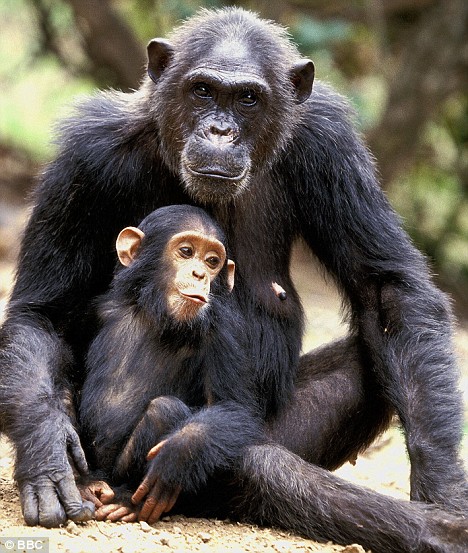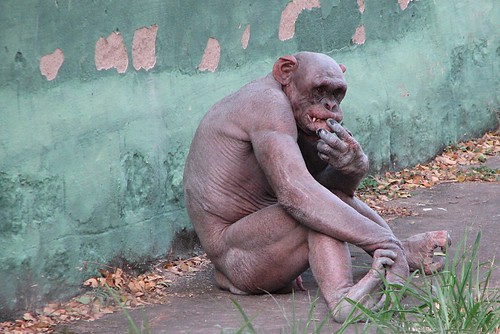A_Wanderer
ONE love, blood, life
This year is going to be the bicentennial of Charles Darwin's birth, and the 150th anniversary of the publication of the species, consequently 2009 is the international year of Darwin; before some posters make a charge of idolatry it's worth highlighting the meticulous observation and evidence based reasoning which Darwin is a model of, and the incredible shaping power that natural selection has had on our vision of the world (from common decent to the biological implications of deep time). He wasn't a God or a prophet, but a man who was able to study, and question, and follow his chain of reasoning to it's inexorable end-point; and that spirit of free inquiry is something that we should all celebrate.
In addition, somebody took the time to upload a terrific TV series from the 70's depicting the Voyage of the Beagle, it combines 19th Century period drama with scientific naturalism, rendering it awesome http://www.youtube.com/watch?v=qfKCVZoY9rE
DESMOND MORRIS: Two centuries on, a salute to Charles Darwin, a hero for our age | Mail Online
Charles Darwin was one of those rare individuals who devoted themselves entirely to the pursuit of knowledge, to the detriment of everything else in their lives. He was, and remains, one of our greatest ever thinkers - a man whose discovery changed the way we see the world.
As a lifelong naturalist myself, he is not only a personal hero but the root from which all my own professional studies stemmed. Which is why I feel it so important to celebrate the anniversary of his birth - if only because I fear many of his core discoveries are in danger of becoming muddled through the prism of modern spiritualism.
For there are plenty of people today - not all of them religious fundamentalists - who seem to think Darwinian evolution cannot explain why, for the most part, humans are a uniquely civilised species.
After all, they posit, how can Darwinism explain empathy, charity or self-sacrifice? How can it explain the 'good deeds' of humans, whether religious or not?
With its emphasis on 'the survival of the fittest', isn't Darwinism simply an excuse for rampant capitalism and personal greed?
To answer this attack, we need to take a closer look at the biology of our species. In our ancient past, when we were evolving as a tribal species, the competition between individuals had to be tempered by a greatly increased urge to cooperate with our companions if our tribe was to flourish.
By a division of labour and by assisting one another, we also helped ourselves to succeed. And one of our great survival weapons was our ability to communicate with one another in much greater detail than other species.
When we developed language, we also became greatly interested in symbolism. The word 'tree' did not look like a tree or sound like a tree, but it nevertheless conjured up an image of a tree in our minds.
Making one thing stand for another in this way was a habit that spread through all aspects of our lives. If we feel protective towards a kitten, it is because the little animal acts as a symbol of a human child and stimulates our parental urges.
If a nun sees each human being as one of 'God's children', then she will want to help them all, as though they were real children. Our good deeds are extensions of our powerful parental feelings, or our inborn urge to co-operate with the members of our tribe.
We are not helpful to one another because of some sophisticated moralising, but because we have evolved that way. It is as much a part of our animal nature as is our urge to compete with one another.
That is the way we are, and there is no need to introduce the pious teachings of the Church to make us good - it is already in our genes.
Creationists will have none of this, and insist that all of nature is the work of what they now call an 'intelligent designer'.
If such a being existed, this monstrous designer would have to accept the responsibility for having created all the wonderful life forms we see around us, and then of cruelly inventing countless unspeakable agonies for them in the shape of leprosy, cholera, cancer, syphilis, plague, malaria, AIDS, fevers, parasitic worms and the rest.
What a charmer this designer must be; creationists are welcome to their hideous creation.
No, Darwinian competition is a much more reassuring scenario. In this, we will, as a species, devote more and more energy to defeating these viruses, bacteria and other parasites. Eventually, we will eradicate them.
We will refuse to accept that it is God's design that we should be made to suffer from these afflictions forever more. We will do our best to improve our lot on this small planet, and to see ourselves as part of a larger, natural environment.
Then, one day, when a major crisis occurs - a massive epidemic that nearly wipes us all out, or a huge asteroid that strikes Earth - we will be ready to evolve a little further and to survive this disaster because natural selection will be able to find just enough of us who can cope with whatever new environment comes our way.
Sooner or later, inevitably, there will be a gigantic planetary upheaval of some kind and Homo post-sapiens will eventually emerge from the chaos.
Let's just hope that it turns out to be Homo super-sapiens, and not Homo sub-sapiens.
In addition, somebody took the time to upload a terrific TV series from the 70's depicting the Voyage of the Beagle, it combines 19th Century period drama with scientific naturalism, rendering it awesome http://www.youtube.com/watch?v=qfKCVZoY9rE





 There was a street party here in Shrewsbury today (the town where he was born) and they had some giant cake in the town square shaped like a globe... or something. I didn't participate in the frivolity, alas.
There was a street party here in Shrewsbury today (the town where he was born) and they had some giant cake in the town square shaped like a globe... or something. I didn't participate in the frivolity, alas.